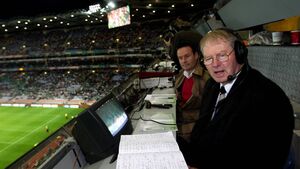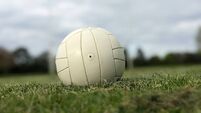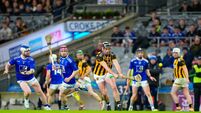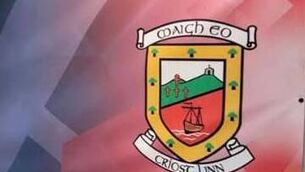Mícheál was a gentleman first, a commentator second

Mícheál Ó Muircheartaigh preparing to commentate on his last game, which was the
Mayo’s heroes of 1950 and ’51 hadn’t an All-Ireland to their name when Mícheál Ó Muircheartaigh made his commentating debut for RTÉ. That came about in 1949, when as a 19-year-old he was handed the mic for the Railway Cup Final. Mayo won that year’s National Football League title having recovered from the disappointment of losing, in rather controversial circumstances, the 1948 All-Ireland SFC Final to Cavan, and they reached the ’49 semi-final too where they were beaten by Meath.
As a county at the forefront of the national consciousness during Mícheál Ó Muircheartaigh’s formative years as a GAA broadcaster, it’s little wonder then how fondly – and vividly – the Kerryman was always able to reflect upon the games involving that legendary group of Mayo players who in winning the Sam Maguire Cup in ’50 and ’51, announced themselves as true giants of Gaelic football.
Ó Muircheartaigh needed no second invitation then, when in 2005 he was invited to attend the Western People Mayo Sports Stars Awards as the special guest and to present the Hall of Fame award to The Flying Doctor, Padraig Carney. Ó Muircheartaigh also presented another of those ’50 and ’51 legends, Dr Mick Loftus, with a Special Achievement award for his exploits in the realm of masters athletics.
The Mayo Sports Stars Awards have welcomed some big-name special guests over the years, Sir Alex Ferguson, Paul McGrath, Ray Houghton, Barry McGuigan and Sonia O’Sullivan to name only a few, but I can honestly say that no guest generated such interest among any attendance as Mícheál Ó Muircheartaigh did that night.
With Dr Padraig Carney flying especially from his home in Long Beach, California to receive his award, almost 650 people packed out the TF Royal Hotel – and it felt like almost every single one of them filed into the queue that formed after the ceremony just to have a word or a photograph with Ó Muircheartaigh who had attended the occasion with his wife Helena.
The skill of the man from Dún Síon, near Dingle, and who remained inextricably ‘Kerry’ despite all his years domiciled on the East coast, was such that through sheer linguistic genius he managed to win the admiration of a nation, whatever their race, creed, gender or age, and regardless of whether they even had any interest in the sport he was commentating on.
If it was intimated once it was probably intimated a thousand times by all those who paid tribute to Ó Muircheartaigh in the wake of his passing last Tuesday, that the man possessed the unique ability to paint a thousand images in the short breath of a sentence. But more than just that, he simply oozed decency; it’s a trait that, dare we say it, is becoming harder and harder to detect in today’s world.
That decency manifested itself in the interest that Mícheál Ó Muircheartaigh always took in the ‘ordinary’ person because for all that he became so well loved and revered for his feverish style of radio commentary, one which was built upon an unrivalled knowledge of characters, players, incidents and the general history of Gaelic games, what I remember most about his appearance at the Mayo Sports Stars Awards in 2005 was his genuineness and ‘man of the people’ type persona. He had the sort of aura that I’m convinced could easily have won him a Presidential race, had he ever thought he might like to reside a few years in the Phoenix Park.
Of the countless people who queued to have a few words with the ‘big man’ or to get their copy of his autobiography signed and personalised that evening, most had a story or two to tell about a previous encounter they had had with him. And what’s more, he remembered most of them – or at least led his friend to believe he did.
Of those who were shaking hands with Micheal for the first time, most felt like they already knew him and within a couple of minutes, they were made feel like he knew them too.
Ar dheis Dé go raibh a anam.




